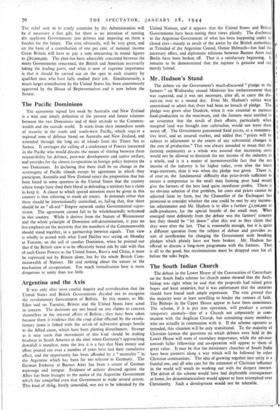Argentina and the Axis
It was only after most careful inquiry and consideration that the United States and British Governments decided not to recognise the revolutionary Government of Bolivia. In this matter, as Mr. Eden said on Tuesday, Britain and the United States have acted in concert. The decisions are not based on any claims to concern themselves in the internal affairs of Bolivia ; they have been taken because there is evidence that the coup d'etat effected by the revolu- tionary junta is linked with the action of subversive groups hostile to the Allied cause, which have been plotting disturbances. Strange as it may seem that movements of this kind should be making headway in South America at the time when Germany's approaching downfall is manifest, none the less it is a fact that Nazi money and effort poured out over a number of years have had their cumulative effect, and the opportunity has been afforded by a " neutrality " in the Argentine which has been far too tolerant to Germany. The German Embassy at Buenos Aires has been a centre of German espionage and intrigue. Evidence of actions directed against the Allies has been brought to the notice of the Argentine Government which has compelled even that Government to make several arrests. This kind of thing, barely concealed, was not to be tolerated by the United Nations, and it appears that the United States and British Governments have been stating their views plainly. The disclosure to the Argentine Goverrunept of what has been happening under its closed eyes—mainly as result of the arrest by the British authorities at Trinidad of the Argentine Consul, Osmar Helmuth—has had the necessary effect, and diplomatic relations between Buenos Aires and Berlin have been broken off. That is a satisfactory beginning. It remains to be demonstrated that the rupture is genuine and not merely formal.


























 Previous page
Previous page